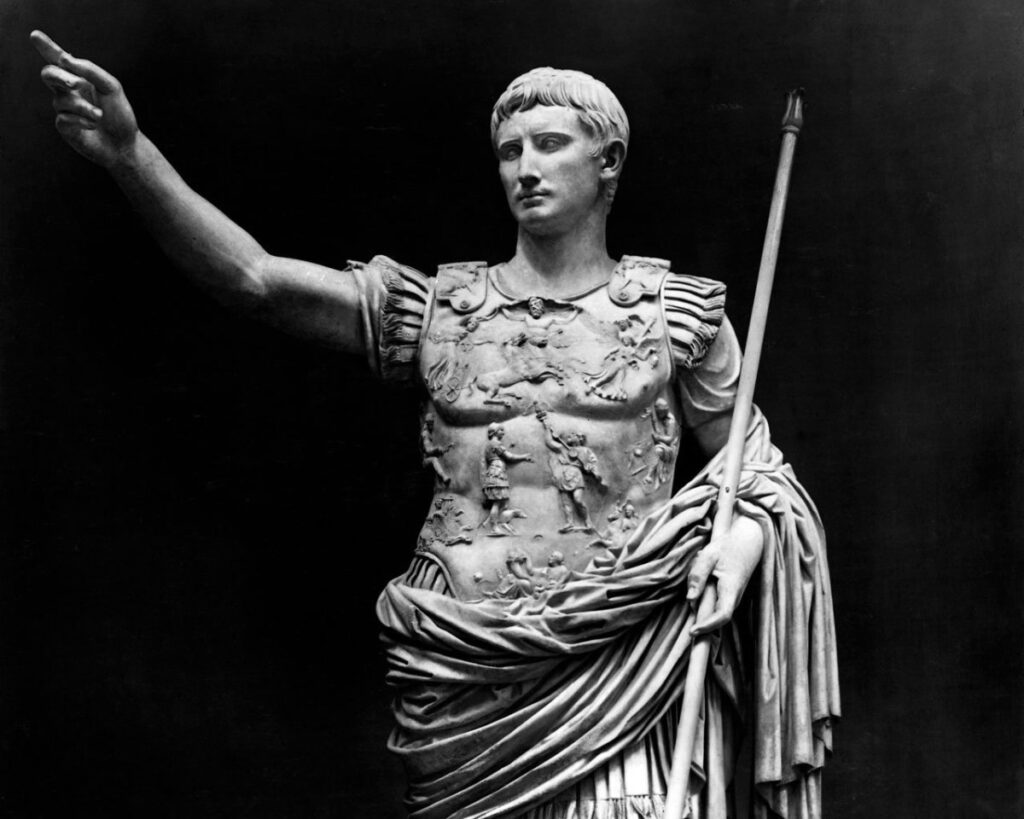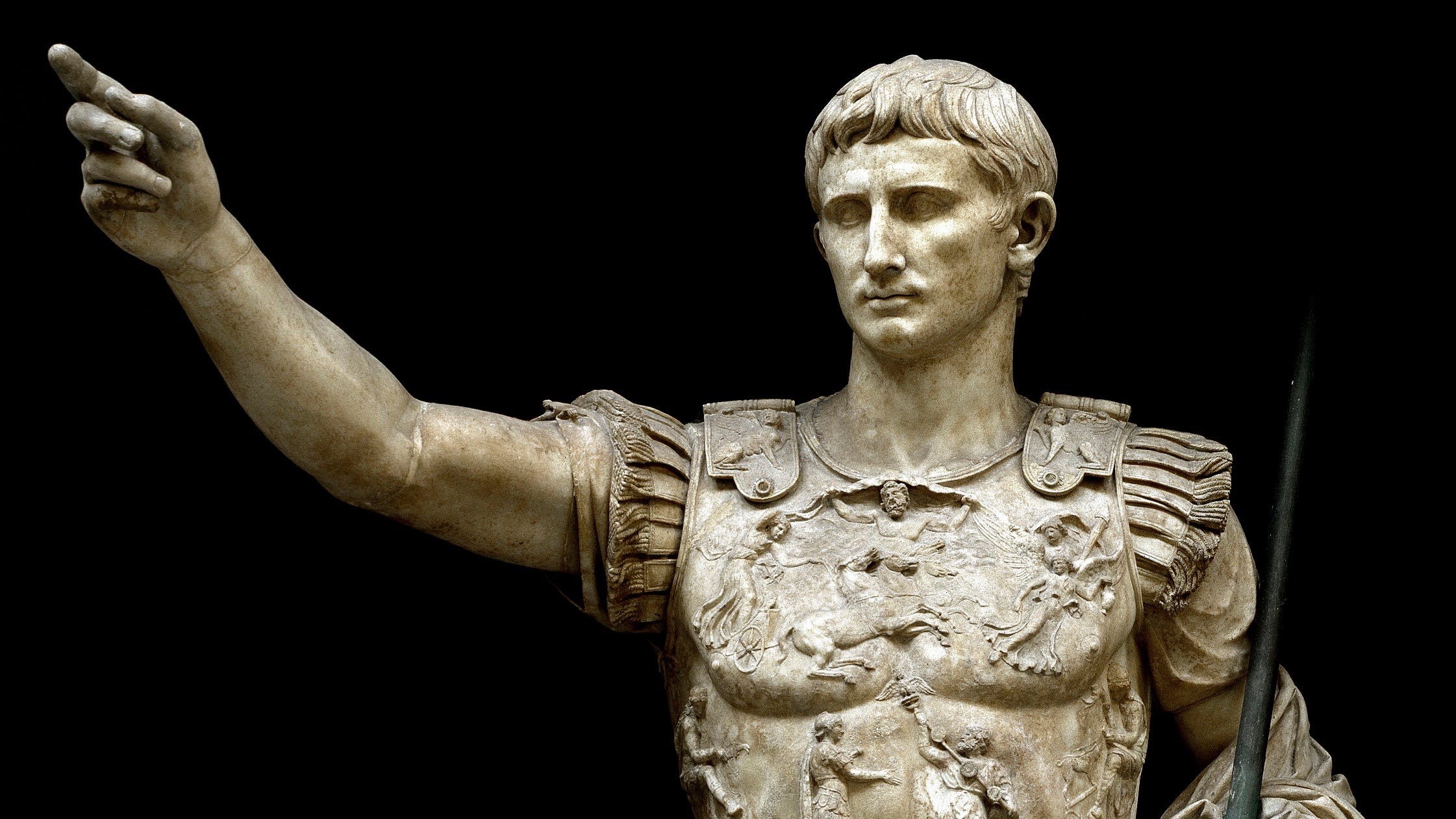Gaius Octavius, often referred to as Octavian, emerged from a humble Plebeian background to become the inaugural Roman Emperor, leaving an indelible mark on Roman history. He is widely recognized by his more common name, Augustus.
Here are some of the most curious and intriguing facets of the life of Julius Caesar’s adopted son and successor, the first Roman Emperor, whose actions contributed to the downfall of Antony and Cleopatra.

1. Augustus held a familial connection to Mark Antony as his brother-in-law.
Many are familiar with the tragic tale of Marcus Antonius and Cleopatra, two ill-fated lovers who aimed to seize control of the Roman Republic from Octavian. What might not be as widely known is that before the clash between Octavian and Antony erupted, Octavian had offered Antony his sister’s hand in marriage.
In 40 BC, Antony and Octavia became husband and wife. It was Octavia’s second marriage and Antony’s fourth, forming an alliance that lasted a mere eight years. This union soured due to Antony’s not-so-secret romantic involvement with Egypt’s Queen Cleopatra. Antony’s actions led to Octavia’s humiliation as he ordered her to return to Rome. Seizing the opportunity, Octavian broke into the Temple of Vestal V!rgins, absconding with Antony’s will, which revealed his intent to bequeath Roman-conquered territories to his sons with Cleopatra following his death.
Octavian’s scheme paid off as the Roman Senate revoked Antony’s consulship and declared war on Cleopatra’s Egypt. This development plunged the Roman Republic into yet another internal conflict.
The battle between Antony and Octavian raged for a mere two years, with the pivotal naval confrontation at Actium sealing the fate of Antony and Cleopatra. The majority of Antony’s fleet was obliterated, resulting in the deaths of 5,000 of his soldiers. Left with no means to wage war against Rome—depleted in ships, manpower, and funds—the star-crossed lovers sought refuge in the Egyptian capital of Alexandria.
Although Antony managed to secure a minor victory in Egypt initially, a significant portion of his troops abandoned him, culminating in another defeat at the hands of Octavian. Upon hearing an unconfirmed report of Cleopatra’s death, Antony chose to be with his beloved by inflicting a fatal wound upon himself, causing immense pain. As he neared his end, he was brought to Cleopatra’s side and ultimately passed away in her embrace.
The war between Antony and Octavian had various contributing factors, but the disintegration of the marital tie that had bound them was the catalyst that turned them against each other. Despite not sharing a direct blood relation, Antony had a familial connection to Julius Caesar, Octavian’s adoptive father. This bond transcended mere brothers-in-law, forging a stronger familial link between them.
2. Augustus achieved the remarkable feat of politically unifying Italy for the first time.
In ancient times, Italy was a diverse patchwork of different states with distinct cultures. Rome, founded in 753 BC, eventually emerged as the dominant power in the region after enduring rivalry with the likes of the Etruscans and Gauls. Roman citizenship was granted to all Italians once Rome established supremacy, but various Italian cities, whether founded by Romans or other Italians, held different administrative statuses. This situation continued until the era of Augustus.
In 7 BC, Augustus issued the edict that established ‘Roman Italy,’ a pivotal move that placed all Italian cities under unified administration, effectively uniting the entire country under the governance of the Roman Empire. This transformation entailed the construction of new roads connecting cities to the capital and led to economic prosperity throughout Italy.
This consolidation endured until 284 AD when Diocletian implemented the division of the Roman Empire into four parts, forming the Tetrarchy. Consequently, Italy faced invasions by barbarian forces and eventually fell under the rule of Visigothic King Odoacer. It wasn’t until the reign of Emperor Justinian that Italy was reintegrated into the Roman (or ‘Byzantine’) domain.
While the establishment of Roman Italy by Augustus may not be widely known, it represents a crucial milestone in the path to Italian unification and laid the foundation for the modern Italian state.
3. There were rumors that Augustus’ wife played a role in his death
As we conclude our exploration of Augustus’ life, it’s fitting to delve into his passing. Emperor Augustus breathed his last on August 19, 14 AD, reaching the venerable age of 76. However, whispers circulated in the Senate that Augustus didn’t simply succumb to old age, sparking rumors of foul play at the hands of his wife, Livia. Some suspected she had administered poisoned figs to hasten his demise.
The Romans, ever wary of reverting to a monarchy after ousting their last king in 509 BC, viewed the prospect with disdain. This fear intensified with the rise of Julius Caesar as dictator in 49 BC and resurfaced upon Augustus’ death. Consequently, the notion that Livia might have poisoned her husband to pave the way for her son Tiberius was embraced by Tiberius’ political opponents.
Tiberius began his reign cautiously, painting himself as an unwilling heir to the title of ‘Princeps’ but a loyal servant of the Roman people. It’s theorized that Livia may have used figs to assist Augustus in his own peaceful transition of power, securing Tiberius’ succession and ending the era of civil wars. However, we can’t state this with certainty.
Augustus remains a captivating historical figure, and his life and accomplishments are worth remembering. After all, you must be an extraordinary individual to have a month named in your honor.
